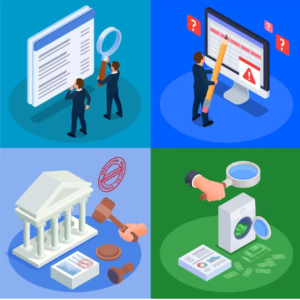Virtual data room for government bids: Government procurement is a fast-paced industry where openness and efficiency are key. The usage of VDRs has become a game-changer as agencies manage the complexity of bidding procedures. Government bids benefit from a Virtual Data Room because it facilitates the exchange of sensitive information, improves collaboration among stakeholders, and guarantees fairness. With an emphasis on how they promote openness and efficiency through the procurement process, this essay will explore the relevance of Virtual Data Rooms within the framework of government bids.
Understanding Virtual Data Rooms (VDRs)
Digital Lockers: What Are They?
When it comes to storing and exchanging sensitive documents, virtual data rooms are the way to go. Financial transactions, mergers, and acquisitions were the first to heavily use VDRs because of the critical importance of data secrecy and limited access. Nevertheless, their use has grown to encompass public sector contracts, where privacy and openness are paramount.

Why Virtual Data Rooms for Government Bids?
Steps to Strengthen Security:
During the bidding process, governments handle a multitude of sensitive information. Virtual data rooms offer top-notch security features like encryption and multi-factor authentication to ensure that only authorized individuals may access important information.
Access Control:
Virtual document repositories let administrators manage who may access, download, and change which documents. This limited access helps keep sensitive information safe by ensuring only authorized individuals can access it.
Paper Trails:
A detailed log of who accessed what data and when is necessary for government bids to be transparent. Administrators may keep a complete record of document exchanges and user activity with the help of virtual data rooms’ thorough audit trails.
- Making Government Bids Open and Honest
- Making All Games Equal
- Fair Information Access:
Different bidders may come out on top in conventional bidding procedures due to differences in the amount of information they can access. To promote an atmosphere of fairness and competition, virtual data rooms make sure that all parties involved have the same access to relevant information.
Constant Updating:
Having up-to-the-minute information is crucial for transparency. By allowing instantaneous updates, VDRs lessen the likelihood of misunderstandings and misinterpretations by ensuring that all parties know any modifications, clarifications, or extra documents.
Working together and staying in touch
Working Together Efficiently:
Government agencies, contractors, and other stakeholders may work together more efficiently using VDRs. Within the Virtual Data Room’s safe confines, stakeholders can ask questions, leave comments, and participate in the conversation.
Methods of Efficient Communication:
Both openness to information and clear expression go hand in hand with transparency. Instead of relying on dispersed emails, all conversations about the offer may be recorded in the virtual data room’s central communication channels.
Strategies for Virtual Data Rooms That Boost SEO
Effortlessly Using Keywords
- A Mutually Beneficial Partnership Between Government Bids and Online Data Rooms
Virtual data rooms (VDRs) and government bids work hand in hand to make the procurement process more open and efficient. - Using Virtual Data Rooms to Secure Government Contracts
When winning government contracts, virtual data rooms are crucial for maintaining an open, fair, and well-documented bidding process.
“Efficient management of government bids with virtual data room technology.”
The Development of Value-Driven RFPs in Public public-sector purchasing
- Transforming Procurement from Paper Files to Online Data Warehouses
Virtual data rooms provide a secure and efficient alternative to the old method of keeping bid-related information in file cabinets. - Government Bidding Made Easier with Virtual Data Rooms
Find out how Virtual Data Rooms are changing how government agencies work together and manage sensitive information. They are a huge technical advancement in government bidding.
Final Thoughts: Future Government Bids Will Be More Open
Finally, government bids incorporating Virtual Data Rooms are a giant step forward in efficiency and openness. Government agencies may use VDRs’ collaborative and secure capabilities to keep the bidding process transparent, equitable, and competitive. The use of Virtual Data Rooms goes beyond a mere technological advancement; it signifies a dedication to a future where government procurement is more open and responsible, especially in light of the ever-changing procurement market.
FAQ
As a safe and effective means for bidders to view bid papers and communicate with procurement officials, virtual data rooms (VDRs) have been more prevalent in government bidding processes. We have compiled these frequently asked questions to help bidders understand VDRs and answer their queries (FAQ).
What is a virtual data room (VDR)?
Virtual document repositories (VDRs) allow users to safely store, exchange, and access sensitive information online. All documentation connected to bids may be found in one convenient place:
- Documents for soliciting bids
- Details on specs
- Price estimates
- Qualifications of vendors
- Query and response databases
What are the benefits of using a VDR for government bids?
Bidders and government organizations alike can get several benefits from VDRs:
- Save time and effort by doing away with physical document delivery and giving bidders 24/7 online access to all relevant papers.
- Virtual data repositories (VDRs) offer strong security features, including user authentication, document encryption, and access restrictions, greatly enhancing data protection.
- Better communication: The VDR platform makes it easy for bidders to ask questions and get answers.
- Time and money saved: Virtual document repositories do away with the need to print and mail documents.
- Enhanced openness: To level the playing field, all bidders can access all relevant information.
Who can access the VDR?
Authorized users, such as:
- Attention all bidders: The VDR will only be accessible to those who have been pre-approved.
- Documents will be accessible to government authorities in charge of procurement who oversee the bidding process.
- Team audits: The VDR can be made available to auditors so they can evaluate it.
What are the typical features of a VDR used for government bids?
Here are some common features:
- Enable safe document uploading, organization, and sharing with thorough document management.
- Forum for questions and answers (Q&A): Post and respond to queries concerning the bid.
- Manage who has access to documents and can make changes using user permissions.
Logs of activity: Keep tabs on everything a user does in the VDR. - Audit trails should provide detailed records of all actions made inside the VDR.
- Features for security: authentication of users, password protection, and 256-bit encryption.
What are the costs associated with using a VDR?
In most cases, virtual data room (VDR) providers base their membership fees on the data storage needed and the number of users. Features like question-and-answer modules and reporting tools may incur extra costs from certain providers.
How can I learn more about using a VDR for government bids?
To assist you in understanding more about their platform, most VDR companies provide free trials and online resources. For further details on their VDR needs, you may also get in touch wi

